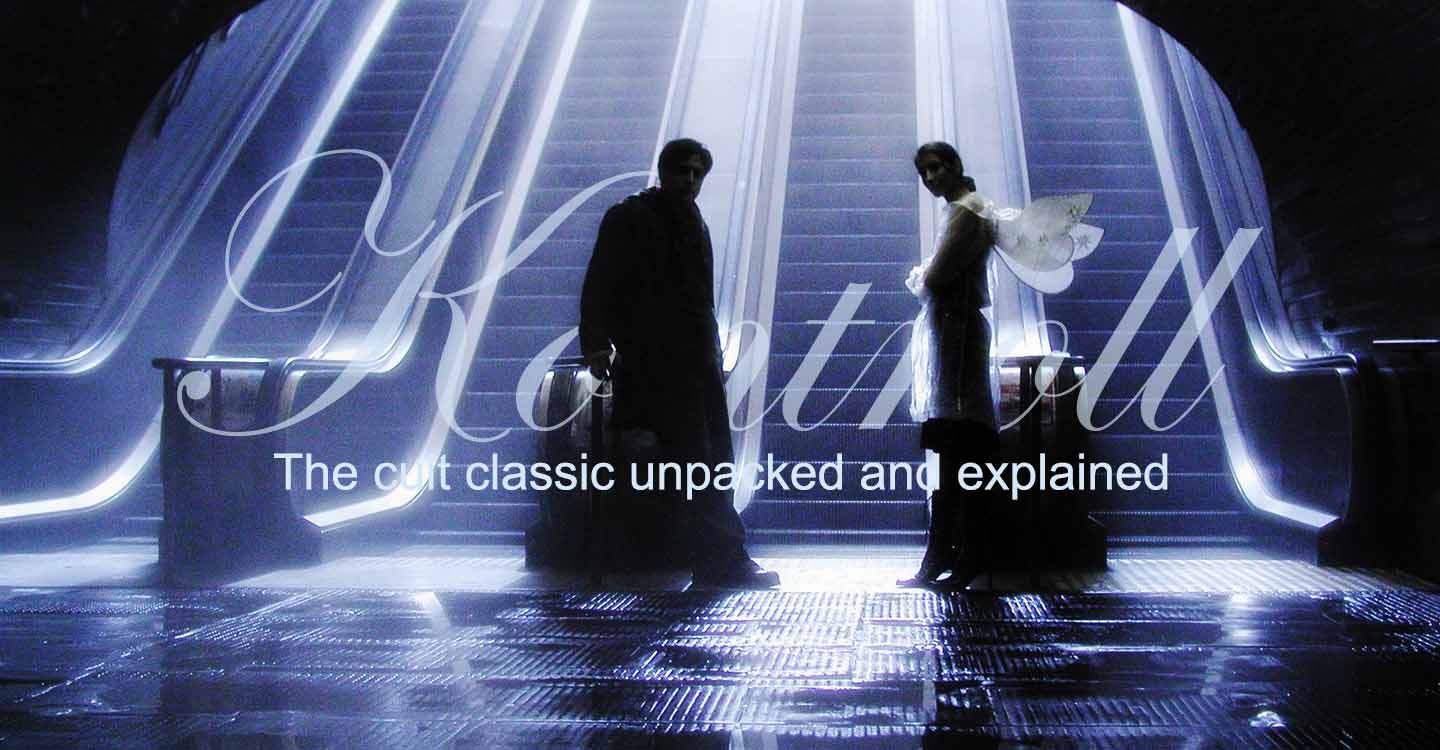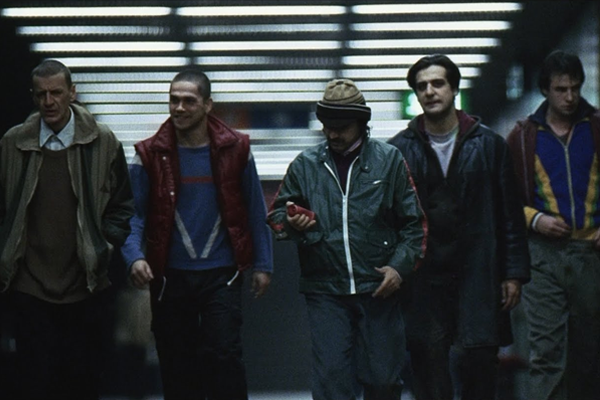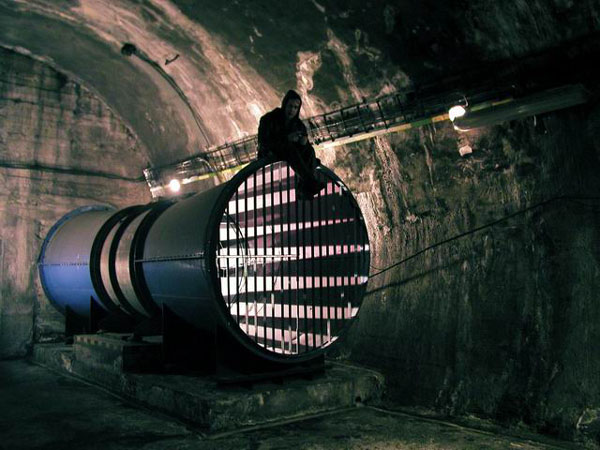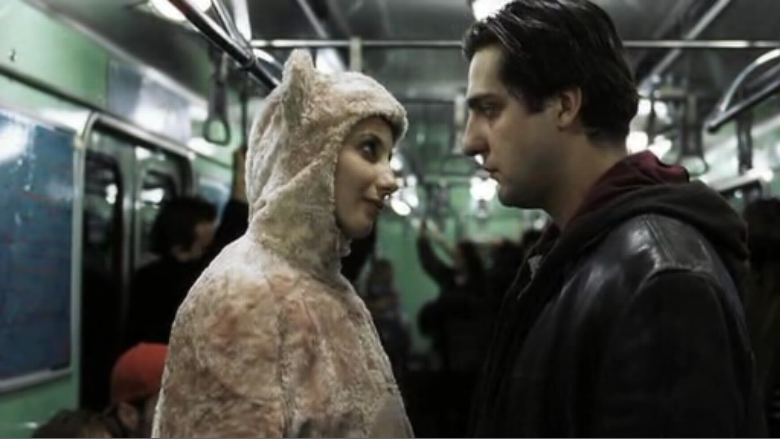Cult Classic Movie Kontroll Reviewed and Explained
Man I love you guys. You keep bringing me more and more cool movies I never would have heard about otherwise. Which is the case for today’s movie Kontroll. Right now, on your screen, is a red tab at the bottom – if you click that you can read other recommendations from other readers, or suggest your own. I mean, right now – you are dying to recommend Pretty in Pink… I know it. Such sleeper film, and so many deep insights to be explored, unpacked, and digested together with other fans. So yeah, BOOM, click the link, add that Molly Ringwald magic, and voila, all of us, who have OBVIOUSLY never heard of Pretty in Pink are now in the know. Just like that. And not only that, odds are? I’ll probably watch your film and unpack it and discuss it in detail. Voila. Brilliance. Which brings me to the cult classic quick review Kontroll explained and digested. Right? Let’s get to the Cult Classic Movie Kontroll Reviewed and Explained.
Kontroll Movie Walkthrough and Explanation
I literally restarted this movie twice, assuming that I was watching the wrong movie. I had wrongly guessed that I was watching a Hungarian ticketing training video or something. I just didn’t get it. But then it got going and I was like, oh, oh, oh… I SEE! Now I know why Dan recommended this little movie to me. Perfect. But trust me, you are on the right movie, just let it unwind a bit before it all starts to make sense.
The Metro is getting hit with a number of suicides happening in the tunnels – and the management appeals to the workers, to try and stop anyone that seems to be trying to attempt suicide on the tracks.
So yeah, Bulcsú is our hero/anti-hero ticket inspector at the Budapest (you have to pronounce Budapest, Budapesht to be cool these days for some reason. Soon I’m going to start calling myself an Ameri-kahhn just to see if I can get it to catch on) Metro system. Our Bulcsú has just completely done a deep dive into the metro world since starting work there. He sleeps on the platforms. He sleeps on the trains. He lives, eats, sleeps the Budapes(h)t Metro. Which, will become important to our understanding of this movie overall as we approach the end. But just trust me on that.
Bulcsú and his team of ticket checkers work to validate tickets for all riders on the trains. (Which reminds me of this great story of this one time I was in Athens. It was a bunch of friends and me, running about the city for about a week. And we just couldn’t figure out the light rail system when we first arrived. It was just inscrutable to us. And so we would just jump on, and ride, and get off where we wanted. And for the entire week, it wasn’t a problem. Until, the very last day. We had all our luggage, and we were set to get on a train to take us to our barge to get to Italy, and then train all the way up to northern England. Well, it was then that we saw our first ticket inspector, and I literally had to fall onto him, so that the others with me could get out of the tram and make a run for it. Meanwhile, I had to figure out how to talk my way off of that train and explain how I didn’t speak the language and that he really didn’t want to send me to jail… hehehe.) There is another rival team that they compete with in order to be considered the best inspector team of the Budapest Metro.
Gonzó, a member of this other team, challenges Bulcsú to a rail run. Which, is this insane idea, where two people, enter the metro tunnel as soon as a train takes off, and they run as fast as they can to get to the next stop before another train comes through, and kills them. Our hero, Bulcsú wins the race and barely manages to save Gonzó at the very last second. A number of other crazy things happen as the movie continues on, including a Metro worker slitting throats, as well as hints that there is a hooded figure actually pushing individuals on to the tracks and to their deaths. And Bulcsú actually witnesses one of these deadly pushes by an individual dressed almost exactly like himself. But Bulcsú is unable to apprehend the individual because of flashbacks and recurrences of nightmares that he has had about this character.
As the movie progresses, we begin to wonder if Bulcsú is all there – is he really holding it all together. He goes missing during night shifts. He wakes up on the platform or in the cars sort of wondering how he got there. And during an office party of the Hungarian Metro workers, Bulcsú starts rail running with that hooded figure he had been trying to catch earlier in the movie. But thankfully, Bulcsú outruns the character, and he actually never comes back out of the tunnel. Bulcsú is met by Szófi, whom he had meet on the train earlier, and told him that she didn’t ever ride with a ticket… but this time, instead of being dressed as a bear, she is dressed as a butterfly… and the two head up to the surface, outside the Metro station together.
Sure, But What Does the Movie Kontroll Mean Man!
Normally, in any of my other reviews, I would toy with you, give you other possible ways to interpret this movie. Feints to deter you from the truth until I could step behind you and pull your own hands from your eyes to reveal the one theory that perfectly unlocks the movie. Like with this one, maybe I discuss Hungary’s history and the plight of the working man, and his struggle with class, (No idea, I’m making crap up from the seat of my pants here). Or, better yet, that it’s about the Hungarian Rendszerváltás, or counter-communist revolution. No, no, I’ve got it, the movie is about the socialist ideas of public transportation and one man’s struggle with independence from this idea of community and self. Hahaha. I don’t know. I really am not sure what crap I’d throw at you.
But with this movie, I am going to go after the jugular. Throughout literature and cinema the single most deeply explored idea is that of the self. The conscious self. The subconscious self. And Bulcsú is you. You are Bulcsú. And this movie? 100% of it, without a doubt, is the internal struggle of the self. Think about it. The entirety of the movie is filmed down in the depths of the Hungarian Metro. You don’t see daylight ever… except for the end, and that may very well just be set-lighting. Ok, so what, I hear you asking… it’s filmed in the subway. But what does the subterranean suppose? What does it mean? It’s a motif that is a stand in for the subconscious mind. This is Bulcú’s internal struggle, his internal battle.
If you aren’t convinced that Bulcsú is the killer, I could walk you through piles and piles of evidence to prove he is, but I will not. I will proffer though, the fact that there are shots of the killer, and there is a birth mark on his hand. And that birthmark matches a birthmark on Bulcsú’s hand. We see Bulcsú sleeping in a fetal position on the platform, we also see the killer sleeping in that same fetal position in several different locations of the Metro. We see interactions between Bulcsú and the killer quick cut to a view of Bulcsú staring at himself in a mirror. I literally can do this all day. The clothes, the gate, the way Bulcsú, when confronted, doesn’t let on that he has encountered the killer and knows things about him no one else knows. Right? Trust me, Bulcsú is the killer.
A more interesting conversation to me? Is whether or not the killings are actually happening. Heck, more interesting to me is whether or not ANY OF THIS is actually happening. Obviously Bulcsú is our killer, but a killer of phantasms and mists slithering through Bulcsú’s own mind. Right? Could be. Could all be true. But ultimately, none of it really matters. The larger point being made here is that this is an internal struggle between Bulcsú and himself. But this shouldn’t be too surprising to you, should it? You argue and war with yourself everyday. You make decisions about saying something nice and saying something cutting every time you open your mouth. You struggle with whether to exaggerate or lie, or whether to tell the truth. You grapple with that desire to be something bigger than you really are, and being honest about who you are and the failings you obviously have.
Heck, I know you have this problem, because I struggle with this every day. I struggle with kontroll every single day of my life. (See what I did there? Klever, eh? hahahaha.) We worry about what others will think of us if they were to know the truth. We struggle with honesty and duplicitousness. Hell, let’s just get really honest here. We all struggle with thoughts of having affairs, killing our spouses, blowing up our work place, fleeing the obligations of life and finding an island in the Caribbean to live out the rest of our already too long lives. (Too honest? Nah, we can never get too honest.) I literally have no idea what you war for control of in your life. But I know you war with yourself. I personally am a Christian, and I see this as an eternal struggle of good and evil. But whether you are spiritual or not, this struggle for control is real in all of us. Freud* documented it, Pascal** discussed it, Einstein*** grappled with it. I literally could name a random intellectual from any field, and I bet you I could find a quote from them about the struggle of the self. Let’s try it – Lewis Carroll! Wait, I’ll be right back. How about this quote?
“Who in the world am I? Ah, that’s the great puzzle.”
Not bad eh? hahaha. Let’s try it again… who, hrm. Someone tricky this time. Why not Sylvester Stallone – he was on the This is Us episode my wife and I watched last night. Oh, sure, how about this quote…
“When you’re scared, when you’re hanging on, when life is hurting you, then you’re going to see what you’re really made of.”
Not bad! But one of my favorites is by my personal favorite poet, T.S. Eliot –
“We shall not cease from exploration, And the end of all our exploring, Will be to arrive where we started, And know the place for the first time.”
Or from my own personal favorite philosopher, Friedrich Nietzsche –
“One must still have chaos in oneself to be able to give birth to a dancing star.”
I literally didn’t mean to turn this into an inspirational quote-fest. And I cannot stand inspirational quotes. Loathe them. They sell magnets, and fuel Pinterest, but that’s about it. But I wanted to make the point that this is a universal struggle. And so yeah, I believe that Kontroll is 100% about this internal struggle in Bulcsú’s personal and mental life. It may be real. It may be a dream. I don’t know honestly. But what we do know is that Bulcsú’s struggle is within himself and this killer that is lurking throughout the Metro. And that struggle is really framing our own daily struggles that we grapple with everyday. Do you give that compliment? The compliment to the person vying with you for that promotion? Your sworn enemy? Hell ya! Give them that honest word of encouragement. Tell them how good they are at that thing you wish you could do as well as the do. This is the playing field for the movie Kontroll.
Kontroll happens to be set in a subterranean subway station of the mind. Your own struggles are cast deep within the recesses of your own brain. And you are the only one privy to your thoughts. You can’t even adequately share them with us even if you wanted to. Right? So here is my encouragement to you. We are all in this struggle for Kontroll together.
I don’t know – could I possibly be wrong? For the first time?! Hahahhaha. What were your thoughts about this Indie Cult film Kontroll? Love to hear your thoughts about it.
Edited by, CY
* – “One day, in retrospect, the years of struggle will strike you as the most beautiful.”
** – “All of humanity’s problems stem from man’s inability to sit quietly in a room alone.”
*** – “A human being is a part of the whole called by us universe, a part limited in time and space. He experiences himself, his thoughts and feelings as something separated from the rest, a kind of optical delusion of his consciousness. This delusion is a kind of prison for us, restricting us to our personal desires and to affection for a few persons nearest to us. Our task must be to free ourselves from this prison by widening our circle of compassion to embrace all living creatures and the whole of nature in its beauty.”






